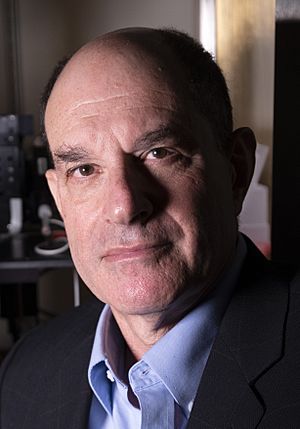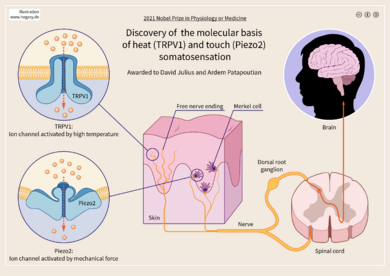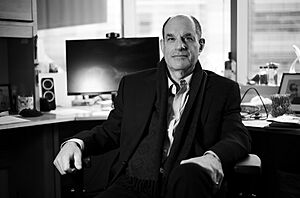David Julius facts for kids
Quick facts for kids
David Julius
|
|
|---|---|

Julius in 2022
|
|
| Born | November 4, 1955 New York City, U.S.
|
| Education | Massachusetts Institute of Technology (BS) University of California, Berkeley (MS, PhD) Columbia University (post-doctoral training) |
| Spouse(s) | Holly Ingraham |
| Awards |
|
| Scientific career | |
| Fields | Physiology Biochemistry Neuroscience |
| Institutions | University of California, San Francisco |
| Thesis | Protein processing and secretion in yeast: biosynthesis of α-factor mating pheromone (1984) |
| Doctoral advisor | Jeremy Thorner Randy Schekman |
| Other academic advisors | Richard Axel Alexander Rich |
David Jay Julius was born on November 4, 1955. He is an American scientist who studies how our bodies work. He won the Nobel Prize for his amazing discoveries about how we feel pain, heat, and cold.
Dr. Julius found special sensors in our bodies. These sensors help us feel the burning heat of a chili pepper or the cool feeling of menthol. He is a professor at the University of California, San Francisco.
In 2021, David Julius won the Nobel Prize in Physiology or Medicine. He shared this award with another scientist, Ardem Patapoutian. They were honored for finding out how our bodies sense temperature and touch.
Early Life and School
David Julius grew up in Brighton Beach, Brooklyn, New York City. He went to Abraham Lincoln High School.
He studied at the Massachusetts Institute of Technology and earned his first degree in 1977. Later, he got his PhD from the University of California, Berkeley in 1984. After that, he did more research at Columbia University.
Discoveries About How We Feel
David Julius started working at the University of California, San Francisco in 1989. His most famous work began in 1997.
He and his team found a special sensor called TRPV1. This sensor is what makes you feel the "hot" sensation from capsaicin. Capsaicin is the chemical that gives chili peppers their spicy kick. They also learned that TRPV1 helps us feel very hot temperatures.
TRPV1 is part of a bigger group of sensors called TRP channels. These channels are like tiny gates in our cells. They open and close to let signals pass through.
Dr. Julius's lab also found other important TRP channels:
- TRPM8 detects menthol and cooler temperatures. This is why mint feels cool in your mouth.
- TRPA1 detects things like mustard oil. This is what gives mustard its sharp, pungent feeling.
These discoveries showed that TRP channels help us sense many different temperatures and chemicals. His team also found natural poisons that affect these channels. They studied how these channels work in different animals. They even used special microscopes to see their detailed shapes.
Dr. Julius's lab also helped discover other important sensors. These include sensors that react to chemicals like serotonin. Serotonin sensors are important for things like mood and digestion. Some medicines for nausea work by targeting these sensors.
From 2007 to 2020, David Julius was the editor of a science magazine called Annual Review of Physiology.
Awards and Honors
David Julius has received many awards for his important scientific work.
- In 2000, he won the first Perl-UNC Neuroscience Prize.
- In 2010, he received the Shaw Prize. This award recognized his work on the sensors that help us feel pain. He also won the Passano Award that year.
- In 2014, he was honored with the Dr. Paul Janssen Award for Biomedical Research.
- In 2017, he won the Gairdner Foundation International Award.
- In 2020, he received the Breakthrough Prize in Life Sciences. He also won the Kavli Prize in Neuroscience with Ardem Patapoutian.
- In 2021, he won the Nobel Prize in Physiology or Medicine. He shared this prize with Ardem Patapoutian. They were recognized for finding the sensors for temperature and touch.
See also
 In Spanish: David Julius para niños
In Spanish: David Julius para niños
- List of Jewish Nobel laureates
 | Calvin Brent |
 | Walter T. Bailey |
 | Martha Cassell Thompson |
 | Alberta Jeannette Cassell |



